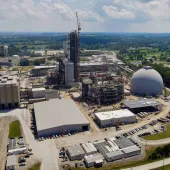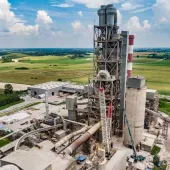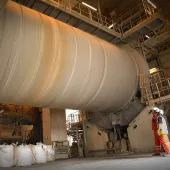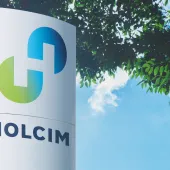First fully decarbonized cement plant in Germany
Heidelberg Materials’ GeZero project aims to capture and store 700,000 tonnes of carbon emissions annually
HEIDELBERG Materials have announced their GeZero carbon capture and storage (CCS) project will fully decarbonize cement production at the company’s Geseke plant in North Rhine-Westphalia, Germany. The first-of-its-kind project will showcase an entire CCS value chain solution for an inland location and aims to capture 700,000 tonnes of CO₂ annually from 2029.
Heidelberg Materials have also confirmed the EU Innovation Fund – one of the world’s largest funding programmes for innovative low-carbon technologies – has chosen the pioneering GeZero CCS project for grant agreement preparation.
‘With GeZero, we will once again show how Heidelberg Materials’ pioneering spirit is paving the way for the decarbonization of our industry,’ said Dr Dominik von Achten, chief executive officer of Heidelberg Materials. ‘We will be the first to realize a full CCS chain for the capture, transport, and permanent storage of all CO₂ emissions from an inland location in Germany.’
GeZero’s unique approach will model a solution for inland sites that are not near the coast or a waterway. The project will implement a transportation solution to bridge the gap until the necessary pipeline infrastructure is available and scaled to capture around 700,000 tonnes of CO₂ annually.
As the CCS facility captures emissions from biomass substituting fossil fuels, Geseke will be one of the first European cement plants able to produce fully decarbonized cement and clinker. Construction of the facility will start in 2026, and commissioning is planned for 2029.
In addition to the capture facility, the GeZero project will bring a new second-generation oxyfuel kiln, combined with CO₂ purification, a liquefaction unit, and rail loading and interim storage facilities. Electrical energy demand will be met by innovative renewable technologies, including the development of a new photovoltaic plant on site.
Project partner Wintershall Dea will be responsible for the permanent storage of the carbon emissions. Once captured, the CO₂ will be transported to Wintershall Dea’s distribution hub in Wilhelmshaven, where it will be subsequently transported via ship/pipeline to offshore storage sites in the North Sea.
Christian Knell, general manager Germany of Heidelberg Materials, commented: ‘This project sets an important milestone for the cement industry and for effective carbon management in Germany. We are now counting on the tailwind of Germany’s future carbon management strategy and the regulatory framework to come.’







